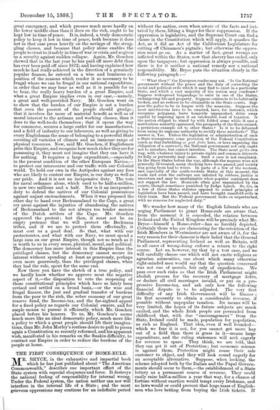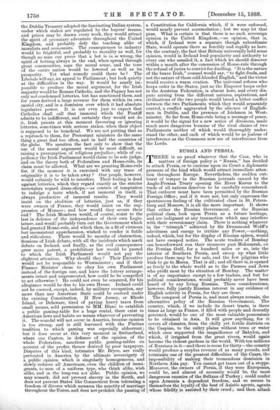l'ILE FIRST CONSEQUENCE OF HOME-RULE.
"VTR. BRYCE, in the exhaustive and impartial book which he has just published about " The American Commonwealth," describes one important effect of the State system with especial eloquence and force. It destroys the national feeling of responsibility for internal wrong. Under the Federal system, the nation neither can nor will without the nation, even when aware of the facts and irri- tated by them, lifting a finger for their suppression. If the oppression is legislative, and the Supreme Court can find a clause in the Constitution which will apply, it quashes the Act, as it did an Act of the Californian Legislature for cutting off Chinamen's pigtails ; but otherwise the oppres- sion must go on. As a matter of fact, great wrongs are inflicted within the States, now that slavery has ended, only upon the taxpayers ; but oppression is always possible, and there is for it neither a national remedy nor a national responsibility. Mr. Bryce puts the situation clearly in the following paragraph :— " What then ?' the European reader may ask. ` Is the National government without the power and the duty of correcting the social and political evils which it may find to exist in a particular State, and which a vast majority of the nation may condemn ? Suppose widespread brigandage to exist in one of the States, endangering life and property. Suppose contracts to be habitually broken, and no redress to be obtainable in the State courts. Sup- pose the police to be in league with the assassins. Suppose the most mischievous laws to be enacted, laws, for instance, which recognise polygamy, leave homicide unpunished, drive away capital by imposing upon it an intolerable load of taxation. Is the nation obliged to stand by with folded arms while it sees a meritorious minority oppressed, the prosperity of the State ruined, a pernicious example set to other States ? Is it to be debarred from using its supreme authority to rectify these mischiefs ?' The answer is, Yes. Unless the legislation or administration of such a State transgresses some provision of the Federal Constitution (such as that forbidding as post facto laws, or laws impairing the obligation of a contract), the National government not only ought not to interfere, but cannot interfere. The State must go its own way, with whatever injury to private rights and common interests its folly or perversity may cause. Such a case is not imaginary. In the Slave States before the wax, although the negroes were not generally ill-treated, many shocking laws were passed, and society was going from bad to worse. In parts of a few of the western, and especially of the south-western States at this moment, the roads and even the railways are infested by robbers, justice is uncertain and may be unattainable when popular sentiment does not support the law. Homicide often goes unpunished by the courts, though sometimes punished by Judge Lynch. So, too, in a few of these States statutes opposed to sound principles of legislation have been passed, and have brought manifold evils in their train. But the Federal government looks on unperturbed, with no remorse for neglected duty."
We wonder how many of the English Liberals who are urging Parliament to grant Home-rule are aware that, from the moment it is conceded, the relation between Ireland and the United Kingdom will be precisely what Mr. Bryce—himself a Home-ruler—has so forcibly depicted. Certainly those who are clamouring for the retention of the Irish Members in Westminster are not aware of it, for the very reason for their clamour is their belief that the General Parliament, representing Ireland as well as Britain, will in all cases of wrong-doing enforce a return to the right course. Let us, however, try that by a test case, and we will carefully choose one which will not excite religious or agrarian animosities, one about which many otherwise right-minded men would say that the question concerned was not one of morals, but only of expediencies. We pass over such risks as that the Irish Parliament might abolish process for the recovery of mortgage debts, or declare all civil marriages invalid, or put on a pro- gressive Income-tax, and ask only how the following financial dispute is to be adjusted. The very first difficulty of any Irish Government will be finance ; its first necessity to obtain a considerable revenue, if possible without unpopular taxation. Its means will be very limited, the hopes of its future subjects are much excited, and the whole Irish people are persuaded from childhood that, with due " encouragement " from the State, Ireland could be made, population for population, as rich as England. That idea, even if well founded— which we fear it is not, for you cannot get more hay out of a field than there is grass in it—means large expenditure, and the ruling statesmen will seek eagerly for revenue to spare. They think, we are told, that they can get it out of Protection ; but economic science is against them, Protection might rouse their sole customer to object, and they will look round eagerly for an acceptable alternative. Suppose, when looking, the scheme adopted both by the Italian and the Papal Govern- ments should occur to them,—the establishment of a State lottery as a permanent source of revenue. They could easily raise half-a-million a year that way, for a chance of fortune without exertion would tempt every Irishman, and the Dublin Treasury adopted the fascinating Italian system, under which stakes are regulated by the buyers' means, and prizes may be drawn every week, they would attract the spirit of pecuniary adventure throughout the United Kingdom, and probably defy the teaching alike of moralists and economist& The consequences to industry would be frightful, and probably to morality as well, for though no man can prove that a bet is in se wrong, the spirit of betting always in the end, when spread through great communities, saps the moral sense, and the tone of the entire nation would. be lowered as well as its prosperity. Yet what remedy could there be ? The Liberals will say, an appeal to Parliament ; but look quietly at the difficulties in the way. It would be nearly im- possible to produce the moral argument, for the Irish majority would be Roman Catholic, and the Papacy has not only not condemned lotteries, but has sanctioned them, and for years derived a large revenue for them within its own sacred city, and in a dominion over which it had absolute legislative power. It is not even just to expect that Catholics shall call that immoral which the Pontiff admits to be indifferent, and certainly they would not do it, Irish priests at this moment favouring or ignoring lotteries, sometimes with serious stakes, when their object is- supposed to be beneficial. We are not putting that as a reproach to them, for Protestant ministers do the same thing a great deal too often, and in half the countries of the globe. We mention the fact only to show that the use of the moral argument would be most difficult, as raising a presumption of religious prejudice ; while of ex- pediency the Irish Parliament would claim to be sole judge, and on the theory both of Federalism and Home-rule, its claim must be allowed. What are we granting Home-rule for, if the moment it is exercised with any trace of originality it is to be taken away ? Our people, however, would. certainly be wild to interfere. Their feeling is dead against lotteries, which they regard exactly as the stricter teetotalers regard dram-shops,—as centres of temptation to indulge a taste which, if not immoral in itself, is always productive of immoral results. They would insist on the abolition of lotteries, just as, if they were owners of France, they would insist on the sup- pression of Monaco ; and how would they secure their end ? The Irish Members would, of course, resist to the last in defence of the independence of their own Legis- lature, and would probably turn out the Government which had granted Home-rule, and which then, in a fit of virtuous but inconsistent apprehension, wished to render it futile and ridiculous. There would be months of obstruction, Sessions of Irish debate, with all the incidents which mark debate on Ireland, and finally, as the evil consequences grew more patent, a prohibitory law would be passed to which the Irish Parliament would not pay the slightest attention. Why should they ? Their Executive would not be responsible to Westminster ; and if their Finance Minister chose to obey his own Parliament instead of the foreign one, and leave the lottery arrange- ments intact and unprosecuted, how could he be compelled to act otherwise ? He could not even be censured, for his allegiance would be due to his own House. Ireland could not be coerced, except, indeed, by military occupation, any more than any American State could be coerced. under the existing Constitution: If New Jersey, or Rhode Island, or Delaware, tired of paying heavy taxes from small means, sold permission to MM; Blanc to establish a public gaming-table for a huge rental, there exist in American laws and habits no means whatever of preventing it. The scandal will not occur in America, because opinion is too strong, and is still leavened with the Puritan tradition to which gaining was especially abhorrent ; but it does occur at this very moment in Switzerland, where one Canton, in defiance of the opinion of the whole Federation, sanctions public gaming-tables on account of the profits thence derived- by poor taxpayers. Disputes of this kind, intimates Mr. Bryce, are really prevented in America by the ultimate sovereignty of a public opinion which is singularly homogeneous, and slowly reduces all Americans, even the children of immi- grants, to men of a uniform type, who think alike, wish alike, and in the long-run act alike. Public opinion, we may remark, did not prevent slavery in the South, and does not prevent States- like Connecticut from tolerating a freedom of divorce which menaces the sanctity of marriage throughout the Union, and does not prohibit the passing, of a Constitution for California which, if it were enforced, would. nearly prevent accumulation ; but we may let that pass. What is certain is that there is no such sovereign opinion in the United Kingdom,—no opinion, that is, which, if Ireland were a separate though subordinate State, would operate there as forcibly and rapidly as here. On the contrary, the fact that Britain universally held some opinion, would. in Ireland lend. popularity and authority to every one who assailed. it, .a fact which we should discover within a month after the concession of Home-rule through the refusal of juries to convict for duelling. "It is the nature of the brave Irish," counsel would say, " to fight duels, and not the nature of those cold-blooded English," and the victor would receive a warm ovation. The universal referee- who keeps order in the States, just as the Emperor keeps order in the Austrian Federation, is absent here, and every dis- pute arising from the different natures, aspirations, and civilisations of the two people would breed a bitter conflict between the two Parliaments which they would separately control, a conflict aggravated by the absence of English- men in Dublin, and the presence of Irishmen in West- minster. So far from Home-rule being a message of peace, it would be the signal for a new series of divisions, made much more dangerous because of the rival claims of two Parliaments neither of which would thoroughly under- stand the other, and each of which would be as jealous of interference as the Commons now are of interference from the Lords.















































 Previous page
Previous page